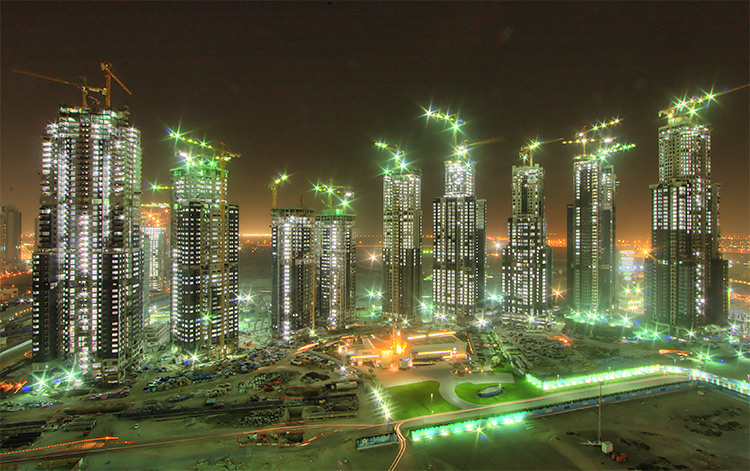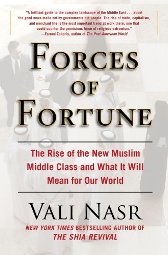
Forces of Fortune: The Rise of the New Muslim Middle Class and What It Will Mean for Our World
by Vali Nasr
–Reviewed by Angilee Shah
 Americans’ view of Iran has certainly evolved since President George Bush declared the rogue nation a part of his “Axis of Evil.” Mild-mannered American travel guide Rick Steves explored “the most surprising and fascinating land he’s ever visited” for an hour-long PBS special in the summer. “Daily Show” correspondent Jason Jones spent a week there before the elections, satirizing the media’s narrow portrayal of the country. And if a backpacker and a comedian are not enough, Americans got a more direct view of the aspirations of Iranian people on Twitter and Facebook, as the middle class led the charge against what they saw as a fraudulent election.
Americans’ view of Iran has certainly evolved since President George Bush declared the rogue nation a part of his “Axis of Evil.” Mild-mannered American travel guide Rick Steves explored “the most surprising and fascinating land he’s ever visited” for an hour-long PBS special in the summer. “Daily Show” correspondent Jason Jones spent a week there before the elections, satirizing the media’s narrow portrayal of the country. And if a backpacker and a comedian are not enough, Americans got a more direct view of the aspirations of Iranian people on Twitter and Facebook, as the middle class led the charge against what they saw as a fraudulent election.
If the discourse on Iran has changed, so too should the focus of America’s foreign policy. Vali Nasr outlines the ways in which we have misunderstood the rise of Islam in the Middle East and advocates for a paradigm shift in Forces of Fortune.
Nasr is an Iranian-born professor of international relations at the Fletcher School of Law and Diplomacy at Tufts University and a senior fellow at the Council on Foreign Relations. His book too begins in Iran, a nation that is poised to become a “true economic powerhouse” because of its tremendous growth and influence in the region. He cites one economist who says that half of Iran’s 70 million people are middle class or above. Iran’s economic stagnation has given this sizable group a reason to be deeply unsatisfied with their folksy president Mahmoud Ahmadinejad.
This is Nasr’s central argument: A strong middle class within a thriving private sector can fuel political change, even when that middle class is Muslim and increasingly conservative. Much like R. Hubbard and William Duggan argue for private enterprise as a primary solution to poverty in The Aid Trap, Nasr argues that, the road to human rights, social freedoms, and democracy runs through business growth and economic progress.”
This simple idea, however, is all too often confused with misconceptions about the nature of Islam. Broad thinking on America’s relationships in the Middle East is limited by the assumption that conservative Islam invariably means violent fundamentalism. But even as Islam grows, fundamentalism is shrinking in the region. The second misconception is that Islam and Western conceptions of capitalism are somehow incompatible. Islam is not a barrier to the growth of a strong middle class, however, and it is certainly not contrary to capitalism. Nasr recounts the story of Pope Benedict XVI’s 2006 visit to the Blue Mosque in Turkey. The Pope asked about script on a tableau. “They were the words of the Prophet, he was told: ‘A merchant is the beloved of God’ (al-kasib habiballah).” Islamic finance is growing quickly, at a rate of 15 to 20 percent in recent years.
Dubai and the “oil princedoms” that surround it are prime examples of Muslims’ embrace of capitalism at dizzying speeds. Nasr points out that with all its excesses, Dubai is still an Islamic city in its laws and culture. Even in Iran, where capitalism is hamstrung by state controls, corruption and nationalized industries, tech savvy entrepreneurs take advantage of a growing mobile industry and filmmakers have created a thriving movie industry. But economic isolation has hamstrung the private sector more than it has hurt the rulers. This summer’s Green Movement showed that sanctions have hurt the very people who are poised to bring about change in Iran.
As we consider our policy toward Iran, and as we ponder Pakistan’s fate, we should look at thriving and stable Muslim countries, such as Turkey, and focus on economic growth rather than military might. While Nasr does not take a comprehensive position on what kinds of program will work best, he begins a dialog about changing direction.
Excerpt: “The great hope of the new middle class rising all around the region – pulling itself up out of the poverty that has provided such rip terrain for the fundamentalist call – is that these business-minded shop-keepers, traders, craftsmen, and civil servants have little or no interest in extremism. The Islam they respect is more moderate, and they have generally not thrown their support behind fundamentalist parties in elections – at least not until those parties have abandoned the fundamentalist component of their stated goals.”
Further Reading: The Shia Revival: How Conflicts within Islam Will Shape the Future, The Age of the Unthinkable: Why the New World Disorder Constantly Surprises Us And What We Can Do About It
and Overthrow: America’s Century of Regime Change from Hawaii to Iraq
Angilee Shah is a freelance journalist who writes about globalization and politics. You can read more of her work at www.angileeshah.com.
*Photo courtesy twocentsworth.




Send A Letter To the Editors